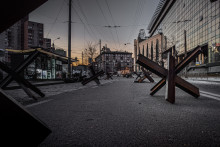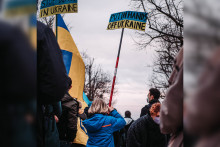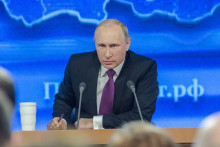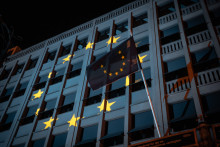On Monday, Ukrainian President Zelensky made a repeated call for negotiations with Russian President Putin. According to Turkey, Russia and Ukraine are even close to an agreement to end the war. But Shawn Donnelly, assistant professor of Technology, Resilience & Europe, expects little from the negotiations. ‘The end of the war is not in sight. In fact, Russia is doubling down on its pursuit of victory through military means. We are now in the fourth week of the war, but it could easily last for years.'
Russia's infantry and armoured units are still performing poorly, Donnelly continues. ‘But that does not apply to their missiles, which unfortunately work very well. It is a clear strategy to massacre the civil population. Just look at the situation in Mariupol. What we see there is consistent with previous Russian actions in Syria and Chechnya.’ For the time being, Russia will continue to use this strategy in Ukraine, the assistant professor believes. ‘Countries only negotiate when they are no longer able to fight, or when their leadership changes. For Russia, neither is yet the case.’
Western response
According to Donnelly, Russia currently benefits from the war being fought inside Ukraine, outside its own borders. For the time being, the West is providing weapons and other supplies to the Ukrainian army, but does not want to directly attack targets within Russia. This explains why the Western allies do not want a so-called ‘no-fly zone’ over Ukraine. ‘In this sense, the West has accepted war in Ukraine rather than defeat, but its initiatives are still limited,' the researcher concludes. 'This includes the EU’s lack of initiative to protect humanitarian corridors for Ukraine’s ten million displaced persons.'
This does not mean that the West, and Europe in particular, is taking no action in terms of military measures. The EU is putting another 500 million euros into weapons and military equipment for Ukraine, and a small rapid deployment force was recently decided. ‘Under pressure, Europe is inclined to work together,’ Donnelly knows. ‘But it goes with baby steps. All of these efforts are pale in comparison to what Europe needs, and what America is doing. In the end Washington still calls the shots.’
Support for Putin
Although the West is keeping its distance for the time being, for Putin the war has been anything but successful. The Ukrainians are putting up a stiff fight and the Russian army is failing miserably. It is unclear what Putin thinks he can achieve with this stalemate. ‘A total military victory is unlikely. Perhaps Putin is prepared to divide the east and west of Ukraine, but I think he wants to annex the entire country. Before the war, Ukraine successfully turned towards the West, and Putin sees this as a major threat.’
For now, Putin's belligerence seems intact. According to Donnelly, it is difficult to estimate what the Russian population thinks about the situation. He emphasises that there is probably still a considerable part of the Russian electorate that supports Putin. ‘For some this support is sincere, for others compliance is coerced and for others support is manipulated. The Russian president has been waging a successful information war for years. In Ukraine, for example, Russians are said to be murdered by 'Nazis'. This narrative is believed by enough Russians to make a difference.’
Donnelly compares this to Trump in the United States. There too, a third of the electorate supports Trump, no matter what he does or says. We saw the excesses of this during the storming of the Capitol. My professional association, the Council for European Studies based in New York, plans to organise an international roundtable event on Russia’s invasion of Ukraine in June. We were in doubt whether the event should be about 'Putin's War' or 'Russia's War'? We chose the second option. What is happening now is not possible without support for Putin in Russia. We should not forget that.’
In collaboration with Studium Generale, U-Today is hosting a Q&A with Shawn Donnelly about the current situation in Ukraine on March 31. You can find the details here.







